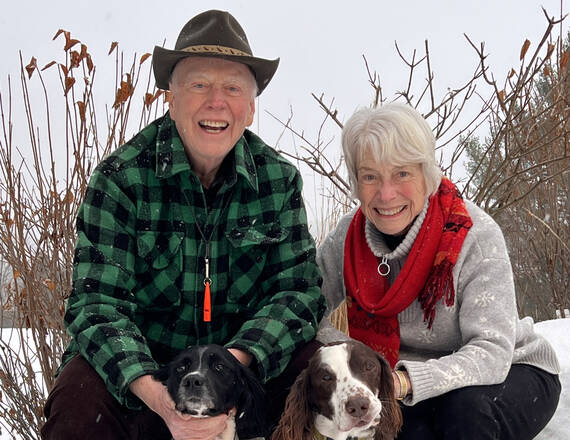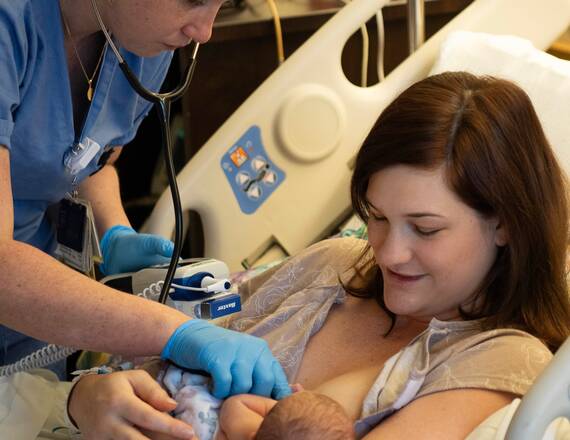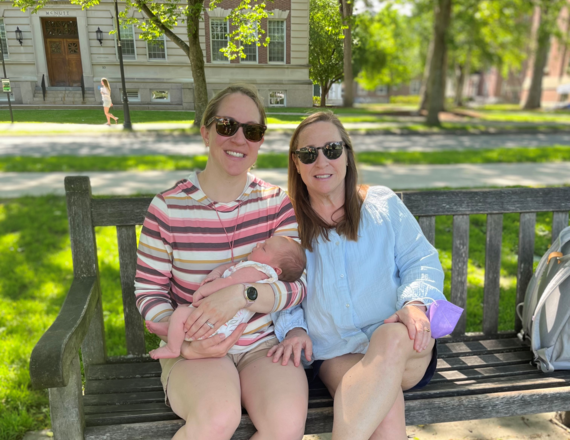Twice the Battle, Twice the Strength
Clark and Sally Todd have faced the trials of cancer not once, but twice—each standing as the other’s unwavering support, with a duo of doctors at Dartmouth Cancer Center also providing care at critical moments.
Fifteen years ago, Sally Todd was diagnosed with carcinoid cancer, a slow-growing yet persistent disease that attacks the digestive tract and lungs. Following initial surgery in Seattle, Sally and her husband Clark hoped to put their cancer journey behind them. Soon after relocating to Vermont to be closer to their daughter in 2018, however, unsettling symptoms brought the couple to Dartmouth Hitchcock Medical Center (DHMC).

There, they met Tim Gardner, MD, MS, a gastroenterologist and director of pancreatic disorders at DHMC. After Sally’s CT scan revealed her cancer had metastasized to her liver and pancreas, Gardner promptly referred her to Kathryn Hourdequin, MD, at Dartmouth Cancer Center.
“Dr. Hourdequin was very interested in my situation,” Sally recollects. “She made me feel more at ease and what she said was always very truthful and open. She told me what to expect. That was all very helpful.”
Dr. Hourdequin’s holistic approach resonated deeply with the Todds. When they considered seeking a second opinion, Dr. Hourdequin not only endorsed the idea but facilitated a referral to her mentor in Boston. The visit confirmed the doctor’s treatment plan—and reinforced the Todds’ confidence in her expertise.
“Dr. Hourdequin knows as much as anybody about carcinoid cancer,” Clark says. “Because we had early detection of this metastasis and it was treated in a knowledgeable, professional way, we’re very grateful for Dartmouth Cancer Center and Dr. Hourdequin.”
Although Sally will live with carcinoid cancer for the rest of her life, Dr. Hourdequin’s treatment has since stabilized her condition so that she can now manage the disease with sandostatin injections once a month.
“It has been heartening to see how well Sally has lived with cancer rather than allowing it to take over her life,” Dr. Hourdequin says.
Part of her successful medical treatment, Sally believes, was Dr. Hourdequin’s engaging nature. “She really cared about me as a whole person and wasn’t just treating the disease. She also keeps in touch with us and we’re very happy about that.”
Two Steps Forward, One Step Back
But the Todds weren’t done with cancer—now, it was Clark’s turn.
“My experience came a little later,” he begins.
Eighteen months ago, chest pains brought him to DHMC for himself. This time, a CT scan revealed an aggressive small cell carcinoma—a disease typically associated with smokers, although Clark never smoked.
Under the care of Cancer Center oncologist Konstantin Dragnev, MD, who Clark says “took command of my disease,” he began a comprehensive treatment plan. Dr. Dragnev and a radiation oncologist put together a regimen of radiation therapy and chemotherapy at the same time.
“That was really a challenge, physically, for me,” Clark shares. That challenge, he believes, was assuaged by Dr. Dragnev’s “marvelous” bedside manner. “He’s very caring. It really is such a great comfort for a patient to have both the clinical competence and the emotional support.”
After enduring multiple rounds of strenuous treatment, Clark’s doctors were happy to discover his cancer was gone. Three months later, however, during a routine follow-up, Dr. Dragnev found that the cancer had returned with a vengeance and spread to Clark’s bones.
To adjust Clark’s treatment plan, Dr. Dragnev removed radiation and replaced it with monthly infusions of immunotherapy in conjunction with chemo.
“He is benefiting from the advances in our understanding of the role of immunotherapy in small cell lung cancer,” Dr. Dragnev says. “The treatment he is receiving was not available just a few years ago.”
“What keeps us all going is the hope of survival,” Clark says. “I told Dr. Dragnev I wanted to know the facts and statistics and he handled that beautifully.”
While thankful for both doctors, the Todds also appreciate having one another during such trying times. Sharing the experience, they believe, has given them an additional strength through empathy.
“Even though I don’t like the fact that we were both ill at the same time, I feel that it’s been wonderful that we could be together on this,” Sally says.
Dr. Hourdequin agrees. “In the six years I have known Sally and Clark, I have been repeatedly impressed by their support of one another,” she reflects. “They come to every appointment together and show true warmth and care towards each other.”
Their profound gratitude for the care they both received has inspired the Todds to give back to Dartmouth Cancer Center. In 2024, the couple pledged a $50,000 planned gift designated for unrestricted research, aiming to support the ongoing efforts that have been so instrumental in their journeys.
“We’re grateful to both doctors for their attention and their expertise in treating the disease. But they can’t be successful without the right environment to work in. So we also want to recognize Dartmouth Cancer Center and Dartmouth Hitchcock [Medical Center], and to honor both of those elements—the providers and the facilities—with something more long-lasting to give them the environment to do their work so well,” Clark explains. “It’s more than the amount of money. It’s what it signifies. From our hearts. Our thankful hearts.”
To learn more about the Honor a Caregiver program, please contact Cate Meno at Cate.Meno@hitchcock.org or 603-646-5794. You can also leave your own tribute for a caregiver through our annual campaign here.
To learn more about planned giving at Dartmouth Health, please contact the Office of Planned Giving at DH.Geisel.Planned.Giving@dartmouth.edu or 603-646-5858, or visit our website here.


